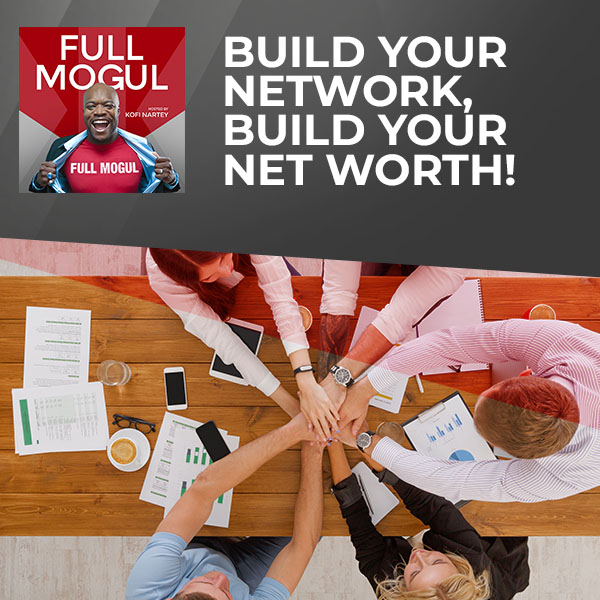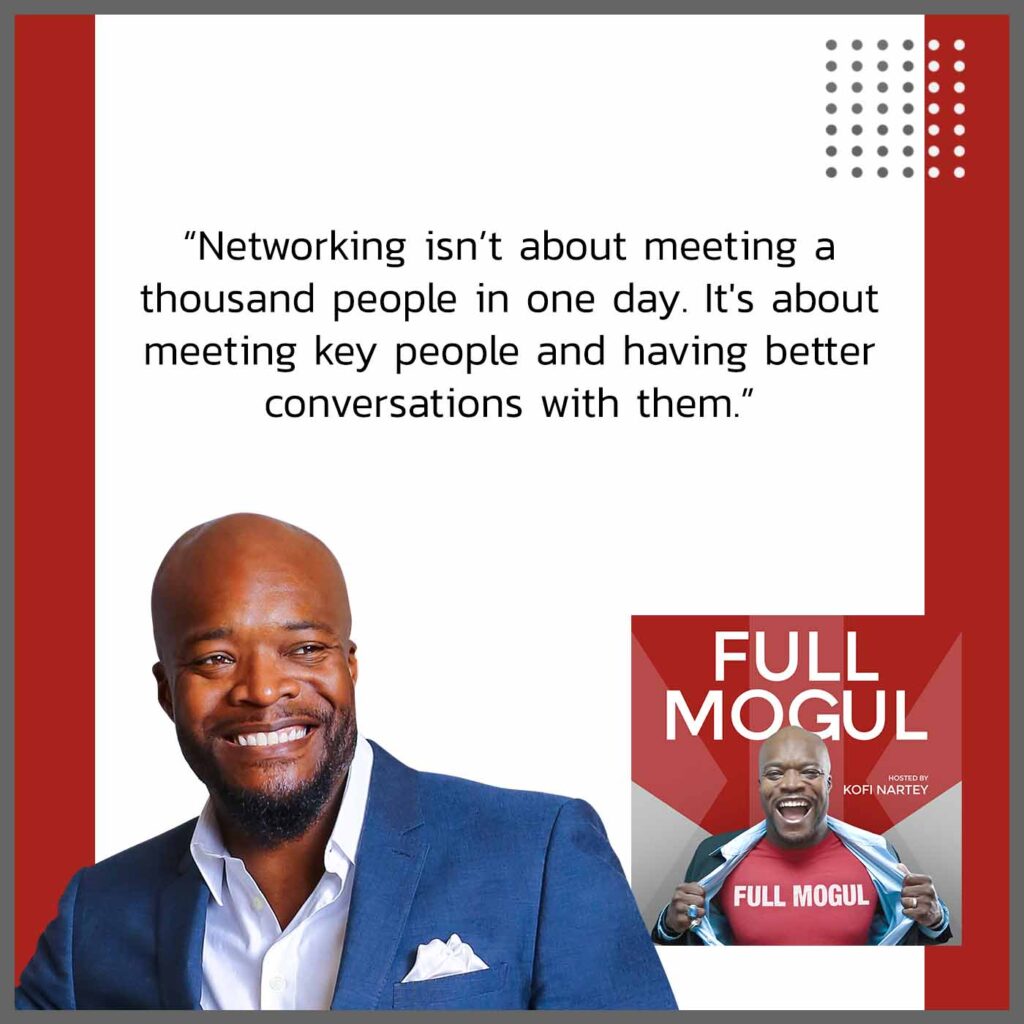

A critical part of being any sales or business professional is networking. As conventional business wisdom says, “Show me your network and I’ll show you your net worth.” But what does networking really mean? How does business and sales tie into it, if at all? Kofi Nartey addresses these questions and more in this quick podcast episode. He gives us four game changing strategies that will help you level up your networking game with little effort. Most importantly, Kofi discusses what networking is not and how you can refine the way you talk to people so each conversation opens up doors of opportunity. Tune in for all of these and more!
—
Listen to the podcast here
Build Your Network, Build Your Net Worth!
Game Changing Strategies For Networking
I hope you have been enjoying the journey. It’s been tremendous fun doing this, sharing it with you, and getting amazing feedback. In this episode, we’re going to touch a little bit more on the business bucket of our full mogul buckets as it relates to business and a little bit about personal because we’re going to dive into networking, build your network and net worth. A critical part of being any sales professional and business professional is the networking aspect.
We’ve all heard about, “Show me your network and I’ll show you your net worth.” There’s a direct correlation between our network, the people that we come into contact with, the people that we have in our circle, and our overall outcome, success, and net worth as it relates to life and our pocketbooks. I wanted to make sure we spent a little time on this. Let’s dive right in. It’s going to be fast and furious.
I want to get this into your systems and minds so you can start utilizing these tools. I’m going to give you, in the midst of this, four keys to bulletproof networking. I’m going to give you a lot more than that, but I’ll make sure you guys leave with those four keys. First, let’s define networking. What is networking? I like to look at networking as building connections and relationships. It’s about building personal connections and relationships. It’s not about doing business, deals, and referrals.
Does it lead to those things? Definitely. If you do it right, will you get those things? Definitely, but that’s not what the networking piece is about. Networking is about making those real connections with people. It’s about depth, not breadth. It’s about going deep with people. I get teased a lot because I’m not a big fan of small talk. As I’ve gotten older, life is much more interesting when I can have meaningful conversations with people.
Networking is about depth, not breadth. It’s going deep with people. Share on XWhen I go to networking events, I’m not running around the room trying to meet as many people as possible. I’d rather meet 1 or 2 people and have an in-depth and real conversation with them, something more meaningful and interesting. It supports the whole concept of networking in building a deeper connection much faster. The shallow end of conversations, I avoid. I don’t love the small talk. Think about it. You think about a swimming pool. The shallow end of the pool is for the kids.
No offense if you love those small-talk conversations, they’re just not for me. When I was in my younger days of business and networking, I also lived in the shallow end. We think of FORD or Family, Occupation, Recreation, and Desires. You want to get through those bullet points with people and use that acronym of FORD when I was networking so I can meet as many people as possible. These days, give me 1 or 2 good conversations and, hopefully, I’ve met the right people in the room, or I get directed to the right people that I do need to meet in the room and I’m winning.
Let’s talk about networking in general. When we think about what it should be about, it’s an opportunity to make a difference or an impact on somebody else’s life or on the life of someone they know. Think about that. Think about your gifts, tools, business, and service, and how that can help other people. You’ll look at networking as an opportunity to share your gifts with other people in a way that can be ultimately impactful and make a difference.

Networking Strategies: Networking should be an opportunity to make an impact on somebody else’s life or on the life of someone they know.
If your product and service are great, you’d rather have people working with you than mediocre competition. That means you’d rather be in front of as many people as possible versus hiding this gift, amazing product, service, culture, and care that goes into the service that you provide versus them landing in the hands of somebody who’s subpar. We have to look at how we get in front of more people. Networking is a great opportunity to do that. It’s not the moment for the sale. It’s the moment for the relationship and the contact to be made that will ultimately lead to a connection, business, sales, and referrals.
With that, I’m going to go ahead and jump right into my four keys to extremely effective networking. This is something that I put a lot of thought into. It’s one of my Kofisms that are bulletproof. You can argue with me about their validity, but you’re going to lose the argument because they’re bulletproof. My four keys to networking were born out of even just living in LA because, in Los Angeles, California, Hollywood, the big city of dreams, big lights, and movie stars, they always talk about, “It’s all about who you know.” I thought about it as it related to networking, and I had to develop that further because I knew a lot of people, but it wasn’t meaningful. I realized its four key ingredients as it relates to networking.
1) It does start with who you know. You have to look for opportunities to increase the number of people that you know. That’s what networking events are for. It starts with access to people, the type of people you like to work with, and the circles that you want to be in, which gives you a chance to get to know other people 2) Who also knows you. It doesn’t matter if you know somebody if they don’t know who you are. They have to know who you are. When you get a chance to make that contact, you have to find ways to go after what we call mindshare. When they think of an industry that you’re in, they think of you, but it does start with that initial contact. They have to know you and you have to be able to stay on their radar. 3) Who knows what you do.
They have to know what you do because you can’t get business referrals or just general warm leads from people who don’t know the business that you’re in. You have to find gentle ways to keep that in play. You have to find ways to let people know what you do and also remind them of what you do. It’s not extremely critical that you go deep into it on the initial contact. I’ll explain why.
It’s because it’s more important to make contact and establish a way of following up. What you do will ultimately come out. If there’s a way to build it into that engagement, it’s even better. Stories are a great way to do that. People ask you, “How was your day?” You can tell a story about how was your day. “How was your week?” You can tell a story about your week. I’m going to give you a little bit more on the story aspect of it after I give you number four
Number four, who likes you? People generally are more apt to do business with someone that they like. First and foremost, can you get the job done? Likability is a factor. One of the keys in networking, as it relates to likability, is being interested, not interesting. You have to be interested in learning more about the person that you’re standing in front of, whom you’ve been introduced to and met at this networking event. That has to be at the forefront more so than you being interesting.
Think about it. In life, people aren’t heard. People go through life. They live at that surface level and shallow conversations and don’t get to the meat of life. You could stand out from the crowd by using 2 ears and 1 mouth and being interested in them. It is learning more about them versus being interesting and just rattling off your resume or your life or talking about yourself.
You can stand out from the crowd by using two ears and one mouth. Share on XI’ll give you guys a funny example. I was at a networking event a couple of years ago. What tends to happen is, in a networking event, you walk in, meet a couple of people, or get introduced to the room, whatever it is. People were mixing and mingling. I went over and introduced myself to a couple of people who were already talking and started asking questions.
In my mind, I was like, “Be interested.” I wanted to hear more about the person I was talking to. I asked several questions. I didn’t even talk about myself at all. They didn’t know what I did. They knew my name. That was about it. I could tell that this person appreciated the questions I was asking and they appreciated just being heard. Somebody else came over and introduced themselves to our little threesome that was standing there. They introduced me. They said, “You have to meet Kofi. He’s a great guy.”
I had just met this person. Now they’re introducing me to the new person as somebody who’s a great guy. What made me great? The fact that I listened and heard the words that they said. You have to be interested, not interesting. As it relates to that, I have a saying that you that some of you have read already. It’s one of my Kofisms as well. It’s listening with selfish ears. That relates to when you’re at an event, at a conference or a speaker is talking, you listen with selfish ears. You listen for the things that resonate with you that can help bridge the gap between where you are now and where you want to be. That way, if you’re listening to somebody who’s talking for 1 or 5 hours, they say that one thing that you’ve heard with selfish ears that resonates with you. It makes all that time worth it.
In networking, listen with giving ears. What do I mean by that? Listen for the opportunity to share something, make a connection, do something, and bring future value to that person in a way that benefits that person. Listen in ways to engage, support, help, and make connections and referrals to them. You’ll even find that a lot of networking groups are non-solicitation groups. Meaning you’re not there to pitch your business. You’re there to make business referrals and people will reciprocate.
Back to storytelling. I love storytelling and teaching people about storytelling as a great way to network and a great way to build mindshare and credibility even because when people ask you what you do and you tell them, versus when people ask you what you do or how you’re doing and you tell them a story, it hits differently. Sometimes I joke, “If I don’t want to have a conversation with someone,” and they say, “What do you do?” I’ll say, “I’m a real estate agent.”

Networking Strategies: Storytelling is a great way to network and a great way to build mindshare.
Those people don’t want to talk to real estate agents. They might ask you, “How’s the market?” and that’s it, but they think you’re going to start to sell them a house right there on the spot. Truthfully, I’m a real estate broker, business owner, and so forth, and much more than that, a businessman, a full mogul. There’s a lot that I can share, but when people ask me about what I do or, “How is your week?” I tell a little story.
Usually, I’ll make up a story that’s based on that specific week that captures not only what I do, but how and who I do it for like, “As a matter of fact, this week was interesting. I was showing one of our luxury properties. The buyer had questions about the equestrian. It’s a very cool property because you can put one horse for every 5,000 square feet of property, and it’s on 3.6 acres. It was great. As a matter of fact, it has a vineyard.” I was telling a story. Later on that week, I met with one of my agents because I had to support them in a deal. We were working on some negotiating strategies. I’d read this book Never Split The Difference. It was great because we used some of the tools from that book to get this guy over the finish line and get the deal done.
“How about you tell me a little bit about your week?” I’ve told a couple of stories that tell you a little bit about what I do, how I do it, who I do it for, and create that credibility. Make sure that you have some stories to tell and that you think about it that way versus just rattling off what you do. I have given you those four bulletproof keys. Let’s recap those real quick.
Four keys to effective networking 1) Who you know, 2) Who also knows you, 3) Who knows what you do, 4) Who likes you. I’m coming back to number three real quick because who knows what you do is up to you to stay on top of your mind and continue to gain what we call mindshare. They think of an industry, real estate, and global. They think of soda and Coca-Cola even if they’re not drinking Coca-Cola. That’s called mindshare. It’s up to you to stay in front of those people. We’ve all had that experience, especially in real estate, where you say, “See a friend of yours you haven’t seen in a while,” and they say, “We just bought a house. We just sold our house. We totally forgot you were in real estate.” You’re like, “I was at your wedding. How could you forget that I was in real estate?”
It happens. It’s not their responsibility to remember. It’s your responsibility to make sure that you stay top of mind. Now we talked about those four keys and staying in touch. Getting their information is more important than giving them your business card. Let’s talk about the business card thing. Some people are like, “I don’t do business cards.” That’s fine, but you do have to have some way of staying in touch. Is it a business card? Are you going to text them on the spot? Are you going to DM them on Instagram? It’s a great way of reaching out to people now and saying, “Are you on Instagram? I’ll follow you. I’ll message you.”
It's not other people’s responsibility to remember you. It's your responsibility to make sure that you stay top of mind. Share on XWe stay in touch that way, especially for the younger generations. Gen Z and Millennials love that. I’ve seen things now like tap where you have a metal business card, you tap their phone and it gives them all the information, or you pull up an app, tap their phone, and give them your information. I have mixed feelings about that because I’ve had people who I’ve tapped. I’ve got their information now they’re contacting my phone. I go a week later to try to remember who they were because I did want to reach out for something and I just don’t remember their name. I’m not scrolling through the 5,000 contacts on my phone to figure it out. I’d rather just send a text because then I can just scroll through my text from the past few days or weeks and find them. It’s easier to do it that way. Sometimes I’ll do both.
Know that if you have a business card, it’s fine to give out your business card, but make sure you get information from them so you can follow up because even if they liked you a lot, it doesn’t mean that they’re going to remember your information or to follow up with you. It’s up to you to follow up. As it relates to DMing or Direct Messaging via social media. That’s what I talked about as an example of a way to stay in touch. Another thing to think about, and this is a pro tool for networking, is to prep your social media before you go to networking events.
What do I mean by that? One of the first things that people do is look you up. If you’re leading with your social media like, “Let’s connect on Instagram, Facebook, or LinkedIn,” they’re going to see your profile. They’re going to see the last thing that you posted. They might even look further and see the last few things. No matter what, they’re going to see the last thing that you posted. Make sure that it’s something that makes sense for the audience you’re going to be in front of. Make sure that it resonates or it aligns with the audience that you’re going to be in front of.
If I’m going into a real estate event, I’m going to post something that’s real estate related. If I’m going to speak to professional athletes or give a keynote for professional athletes and entertainers, I’m going to do something that’s related to that or in my top 2 or 3 posts, maybe something from my acting days, a throwback from my sports days, or the fact that I work with celebrities, entertainers, and affluent and luxury clientele. It’s going to resonate with the audience that I’m going to be in front of. There’s immediate credibility when I introduce myself and increased reinforced credibility when they look me up and they see that my story, social media, or social proof is in alignment with who I said I was.
At the end of the day, you have these tools now to help you with your networking and your networking opportunities. Make sure you’re finding groups that make sense to network in. You can also create your own networking groups, but make sure that it’s a networking group that’s effective, not just the social group. Social groups are a little different. They’re fine, but they’re not networking groups. Make sure you either are creating or finding the right networking groups to be a part of.
Make sure you’re either creating or finding the right networking groups to be a part of. Share on XWith that, you can go forth and build your network. Remember, it’s about going deep with the people that you connect with and building those relationships. It’s not about 1,000 people that you meet in one day. It’s about meeting those key people and having better conversations with them. Remember the four tips that I shared with you. The mindshare that you gain with these strategic contacts and you continue to follow up and go deeper with people is what’s going to lead to the word-of-mouth referrals and to them reaching out to you to do business with you.

There are a few things that are more powerful than those warm introductions, referrals, and word of mouth that you can use to help build your business. I hope this was helpful, these tools for networking. If it was, please share it with your team, your group at your office, your company, and with a friend. Reach out to me. Let me know if this was helpful. Let’s stay on that full mogul journey together. Let’s keep going. We’ll talk soon. Thanks.
Important Link
BACK TO BLOG